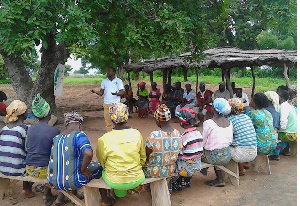One major factor contributing to household food insecurity in the West Mamprusi District of the Northern Region is the denial of smallholder women farmers to agricultural productive land, research findings have revealed.
The findings showed that by gender, most of the fertile farmlands are owned and controlled by the male family heads of the various communities.
These were made known at a sensitisation forum organised at the Tikarinongu community in the district on Saturday, which was attended by stakeholders including traditional authorities, opinion leaders, women and youth groups, local authorities among others.
The research was conducted by the Tikarinongu Cooperative Farmers and Marketing Union at the Tikarinongu community, one of the communities in the District. It was funded by the Business Sector Advocacy Challenged (BUSAC) Fund. It aimed at addressing the challenges confronting smallholder rural women farmers in the White Volta basin in the West Mamprusi District of the Northern Region of Ghana. The Tikarinongu Cooperative Farmers and Marketing Union is a predominantly women group, largely into farming and other agribusiness in the area. The findings showed that women only depended on marginal and infertile lands which have been abandoned by their male counter parts for farming.
This, the research noted, affected the size of smallholder rural women farmer’s farms and variety of crops in the area leading to the food insecurity in many of the households in the community. It also cited that most of the smallholder rural women farmers in the area also lacked access to credit facility, labour, traction services as well as general agricultural advisory services, such as agriculture extension services.
Whilst the research indicated that women in the communities are not considered when it comes to decision-making process pertaining to the land inheritance, other group members whose families do not have land at the river site cannot farm there.
It recommended advocacy and sensitisation programmes to be carried out in the communities targeting traditional authorities, opinion leaders, local authorities, Civil Society Organisations, Women groups, among others, to ensure that smallholder rural women farmers gain access to productive lands, as well as government’s agriculture policies and programmes particularly on agriculture extension, credit facilities and good record keeping.
The Financial Secretary of the Tikarinongu Cooperative Farmers and Marketing Union, Mr James Adocta Agandaa, indicated that research had proven that most women farmers were doing well in all areas of mechanised agriculture, where the land ownership is not determined by traditional customs and beliefs and cited the Tono and Vea Irrigation Projects in the Upper East Region as examples.
The Financial Secretary who explained that the study formed part of the implementation processes of the BUSAC Fund, adding that the findings would be used to effectively engage with stakeholders, including the land owners, male farmer associations, chiefs and the Ministry of Food and Agriculture for the release of productive lands for the Tikarinungu Cooperative Farmers and Marketing Union members who are predominately women farmers.
He said the research further revealed that the most fertile lands were those around the river side and that people offered food in return for using land for their agricultural activities.
The Monitor of BUSAC Fund, Mr Vincent Subbey, explained that the BUSAC Fund programme seeks to build capacities of Private Sector Organisations to identify, analyse and research into challenges in the business environment that hinder their development and growth.
General News of Wednesday, 29 August 2018
Source: Samuel Akapule

















